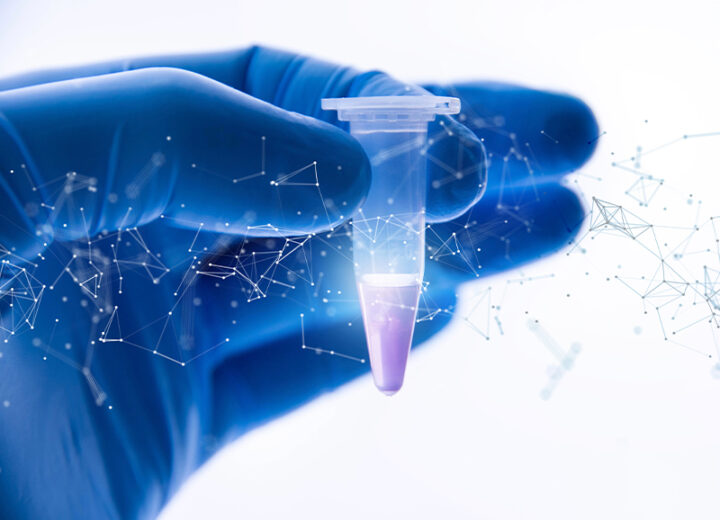14 November 2024
Why recombinant enzymes are the key to life sciences R&D

Even though the fields of life sciences and healthcare are developing rapidly, their innovation often relies on the smallest building blocks. Among these, recombinant enzymes stand out as the workhorses driving progress in research and development (R&D).
These engineered proteins are indispensable in a range of applications, from gene sequencing to mRNA development. But what makes recombinant enzymes so crucial, and how are they reshaping the landscape of R&D?
Let’s dive into the world of recombinant enzymes and explore their vital role in today’s scientific advancements.
What are recombinant enzymes?
Recombinant enzymes are proteins that have been genetically engineered in an expression system—typically bacteria, yeast, or mammalian cells—to produce enzymes with specific functions. Unlike naturally occurring enzymes, recombinant enzymes can be customized for various applications. As a result, they are incredibly valuable in both life sciences and healthcare.
Customization and unique expression approaches have further improved their value. Using the right techniques, they can be produced in large quantities with high levels of purity. This has opened the door to numerous innovations, such as gene sequencing and personalized medicine.
These enzymes are often the key components in complex biological processes, allowing scientists to conduct experiments that were once unimaginable.
Native enzymes vs recombinant enzymes
When it comes to experimentation, researchers must choose between recombinant enzymes vs native enzymes. On one hand, native enzymes are naturally occurring and can be extracted from tissues, plants or microbial sources. On the other, recombinant enzymes come out on top when considering several qualities:
- Consistency and reliability: native enzymes display batch-to-batch variability, while recombinant enzymes are produced in controlled conditions.
- Purity and activity levels: native enzymes come with more risks of inconsistencies and impurities. Recombinant enzymes can be engineered for specific purity levels.
- Scalability and supply: native enzymes, being naturally sourced, aren’t very scalable. However, recombinant enzyme production can be scaled with the right system.
- Cost-effectiveness: with scalable yields and controlled materials, recombinant enzyme production is often more cost-effective.
To get the full comparison of native vs recombinant enzymes, read this blog.
The production of recombinant enzymes
Recombinant enzymes must be produced under careful conditions. Therefore, to achieve the high levels of quality, yield, and functionality that life sciences use cases require, the right production process is essential.
First, the choice of host cell, such as E. coli, yeast, or mammalian cells, significantly impacts the enzyme’s properties and yield. Equally, the expression system—whether bacterial, yeast, insect, or mammalian—determines the complexity of post-translational modifications, crucial for enzyme functionality in specific applications.
Finally, environmental conditions must be closely monitored and maintained. Temperature, pH, nutrient levels, and more, play critical roles in optimizing the characteristics of recombinant enzymes.
As a result, all of these factors must be fine-tuned to deliver a suitable enzyme product.
The role of recombinant enzymes in life sciences and healthcare
Recombinant enzymes are versatile tools with broad applications across the life sciences and healthcare industries. Their use spans from basic research to clinical therapies, all of which carry huge importance.
1. Gene sequencing
Gene sequencing is one of the most transformative technologies in modern biology. At the heart of this process are recombinant enzymes. Enzymes like DNA polymerases, ligases, and nucleases are essential for accurately reading and interpreting genetic material. These enzymes help to amplify, cut, and join DNA sequences, enabling researchers to decode genomes, study genetic disorders, and even develop personalized medicine.
In gene sequencing, the precision and efficiency of recombinant enzymes allow scientists to process vast amounts of genetic data quickly. Without them, the rapid advancements we’ve experienced in genomics and personalized healthcare wouldn’t have been possible.
Discover more use cases of recombinant enzymes in gene sequencing.
2. mRNA development
Messenger RNA (mRNA) is a life-changing development. The recent focus on this technology, particularly with the development of COVID-19 vaccines, has brought recombinant enzymes into the spotlight. For example, T7 RNA polymerase, which is used to transcribe DNA into mRNA, is crucial in the production of mRNA-based therapies and vaccines.
These enzymes ensure that the mRNA produced is of high quality and suitable for therapeutic use. The reliability and scalability of recombinant enzyme activities have made them indispensable in the mass production of mRNA. Because of this, mRNA technology is set to revolutionize not only vaccines but also treatments for a wide range of diseases, from cancer to rare genetic disorders.
YOU MAY ALSO LIKE: Making mRNA treatments accessible to low-income countries
3. Drug discovery and development
In drug discovery and development, recombinant enzymes facilitate the exploration and creation of new therapeutics. Specific enzymes are often used to catalyze chemical reactions central to the synthesis of potential drug compounds. By designing custom recombinant enzymes that target specific reactions or pathways, researchers can streamline the drug discovery process, making it faster and more efficient.
For example, enzymes involved in metabolic pathways can be engineered to facilitate the creation of new drug molecules. These enzymes help researchers understand how a drug interacts with biological systems, providing insights into its efficacy and potential side effects.
Additionally, recombinant enzymes can be used to create novel compounds that might serve as the basis for future therapies.
RELATED: Recombinant proteins, techniques and uses – a guide
Innovations in recombinant enzymes
Scientists are dedicated to developing new techniques and technologies in order to make recombinant enzyme development more accessible. Traditional approaches come with various challenges, from the high costs to the lengthy timelines and unpredictable expression rates.
Therefore, to make this process quicker, more reliable, and more effective, the industry is focused on innovation. In order to demonstrate this, here are a few of the most impactful developments:
Advanced expression systems
The production of recombinant enzymes can be incredibly challenging. As a result, some more complex enzymes being described as ‘impossible’ to produce.
These enzymes are difficult to express using traditional expression systems. Often, this is because their complex structure or post-translational modification requirements aren’t supported by the simpler host organisms. As a result, the functionality or yields required can’t be achieved.
Nevertheless, these complex enzymes are more vital to R&D than any other. They offer opportunities for new, potentially life-saving solutions to be explored and developed. That’s why advanced expressions are being developed to overcome these challenges.
Using different host organisms and novel technologies, companies like Cocoon Bioscience are revolutionizing the production of complex enzymes, producing higher yields for even the most intricate target proteins.
Read more about the ‘impossible’ enzyme challenge (and how Cocoon Bioscience is solving it) here.
Custom recombinant enzymes for R&D
Customization is where recombinant enzymes truly shine. Off-the-shelf enzymes may work for standard applications, but research and development work often requires tailored solutions. Custom recombinant enzymes allow scientists to fine-tune reactions, increase efficiency, and achieve more accurate results.
For example, in mRNA development, custom enzymes ensure that the mRNA produced is stable, efficient, and functional. This is crucial for the effectiveness of mRNA-based treatments. It also helps with developing new therapies, as it reduces the risk of inefficiencies and improves the success rate of experiments.
For example, consider drug development. Custom enzymes are particularly valuable because they allow for precise control over chemical reactions, reducing unwanted by-products and improving the overall yield of drug candidates. This both accelerates development and gives researchers more opportunity to explore a wider range of therapeutic possibilities.
YOU MAY ALSO LIKE: The role of a manufacturer in accelerating enzyme research
High throughput screening
High-throughput screening (HTS) is also transforming recombinant enzyme development.
It rapidly tests thousands of enzyme variants to find those with the best properties. This speeds up discovery for drug and therapeutic applications. In biopharmaceuticals, HTS reduces time and costs by streamlining the optimization process. As HTS advances, it will play an even larger role in creating new therapies.
READ MORE: The future of recombinant enzyme production in life sciences
Cocoon Bioscience’s innovative approach to recombinant enzyme production
At Cocoon, we’re pushing the boundaries of recombinant enzyme production by leveraging insect cocoons as natural bioreactors. This unique approach not only reduces the environmental impact of enzyme production but also allows us to produce high levels of recombinant enzymes with exceptional purity and functionality.
Using cocoons gives us a highly controlled environment for enzyme production. This offers several advantages. For example, reduced contamination risks and the ability to produce enzymes that are difficult to express in traditional systems.
Moreover, Cocoon’s approach is scalable. The volume can be easily increased or decreased with little investment in more materials, making it suitable for both small-scale research and large-scale industrial applications.
Here’s an example comparing Cocoon Bioscience’s CrisBio® platform to traditional methods for producing pyrophosphatase that showcases these benefits.
If you’re ready to take your research or product development to the next level, explore our enzymes development solution.


